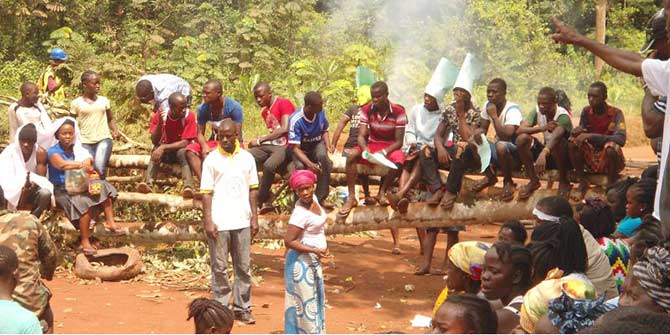Daivi Rodima-Taylor explores the evolution of land mortgage in African countries.
Recent economic and political changes have fuelled uncertainties in land access in many parts of the world. Land mortgage has emerged as a novel tool for agrarian restructuring in many post-authoritarian settings. In the current era of growing regional and transnational mobility, land titling and mortgages are also increasingly used to re-establish order and security in the situations of post-conflict resettlement in many areas of Africa.
This new emphasis on mortgage as a social restructuring device calls for more investigation into the processes entailed in the ongoing rural financialisation in emerging economies. The recent collection of the Boston University Land Mortgage Working Group Mortgage across Cultures: Land, Finance, and Epistemology (co-edited by Daivi Rodima-Taylor and Parker Shipton) combines interdisciplinary insights into the ongoing processes of land financialisation, drawing upon historical experiences, cultural meanings, and locally informed perspectives. It includes contributions by Sara Berry, David Seipp, Kristine Juul, Anand Swamy, Lotte Meinert, Mette Kusk, Stefan Dorondel, Marioara Rusu, and Georgia Hartman.
Land titling has historically often occurred in situations of immigration and resettlement with a goal to secure access to land for certain populations or enhance the security of tenure. Individual land titles have also been viewed as a tool to enhance the efficiency of rural production. The mortgage as a deadlined pledge linking property to credit is central to these processes. Land pledging, where a borrower grants another person the right to use his or her farmland until repayment of the borrowed sum, has existed in Africa since pre-colonial times. It served as an important source of credit, but also as a form of land sales, and as a mechanism to integrate outsiders in local communities. It is often highly personal and based on complementary interests between parties who have unequal access to productive resources.
Land pledging has therefore features in common with other customary contracts in Africa, such as flexibility and lack of finality, and need for consent of family and kin. Jural rights emanated from multiplex social ties between people, including kinship and co-residence. Similar patterns can also be observed elsewhere in the world. The primacy of interpersonal transactions and flexibility of mortgage arrangements characterises many historical instances from Europe and Asia. The meaning of such institutional arrangements as mortgage should therefore be conceptualised within their historical and socio-cultural context.
The outcomes of present-day land mortgage reforms as devices to manage broad-based transitions in post-socialist and post-conflict settings have remained uneven and ambiguous. While in some cases fostering entrepreneurial initiative and small scale farming, they have also led to legal and administrative ambiguities and a proliferation of alternative institutional arrangements. Post-socialist landholding, mixing older and newer kinds of entitlements and collectivities, has been vulnerable to manipulation by different actors, and the recent introduction of land mortgage may have exacerbated land disputes in many transitional areas.

Emerging evidence from post-conflict areas of Africa, such as northern Uganda, also questions the role of land titling reforms as a panacea for building social harmony and economic security. Instead of helping to reduce chaos and conflicts in resettling communities, land mortgage can lead to conflicting land sales tangled in a complex web of social relationships. As access to land in Africa has traditionally occurred through membership in a kin group, the ongoing search for indigenous forms of political authority and property holding entails particular attention to the role of kinship and clanship in shaping land claims.
Introduction of land mortgages is not a politically neutral process. More attention is needed to authorities on different scales who mediate the application of new tenure rules, and to emerging broader patterns of inclusion and exclusion. There is some evidence that recent land mortgaging has led to increased conflicts over land sales, ownership, and use. In other instances, the new institutions of financialisation may have served as a tool for validating belonging in a community, used by people to enhance inclusion in the areas of resettlement and mobility.
In many cases from Africa and elsewhere in the developing world, new formal mortgages co-exist with various forms of informal land pledging, each entailing different dynamics and expectations. Financial practices such as mortgage and foreclosure facilitate particular types of social relationships. Land credit should be viewed within a complex web of existing reciprocal credit relationships, and as embedded in social and cultural norms. More research is needed on how people manage and use their mortgage credit, and how it affects family dynamics, including impact on the younger generation, women, and the elderly. The increasing formalisation of rural financialisation in many transitional contexts calls for more ethnographic and historical investigation of the relationships between borrowers (farmers, new homeowners, etc.) and lenders (banks and other financial institutions offering land and housing credit), as well as interplay of mortgage with the plurality of local entitlements and jural rules (including customary and statutory, informal and formal land tenure systems). Systematic comparative exploration of the culture-bound institution of land mortgage can result in a fruitful rethinking of the premises of contemporary landholding, finance, and trust.
Read more about this topic in the report: Mortgage across Cultures: Land, Finance, and Epistemology
Dr Daivi Rodima-Taylor (@DaiviRTaylor) is Research Associate at the Frederick S. Pardee School of Global Studies, Boston University. Her research focuses on fiduciary culture and infrastructures, informal economies, land rights and conflicts, and migration and diaspora.
The views expressed in this post are those of the author and in no way reflect those of the Africa at LSE blog, the Firoz Lalji Centre for Africa or the London School of Economics and Political Science.





